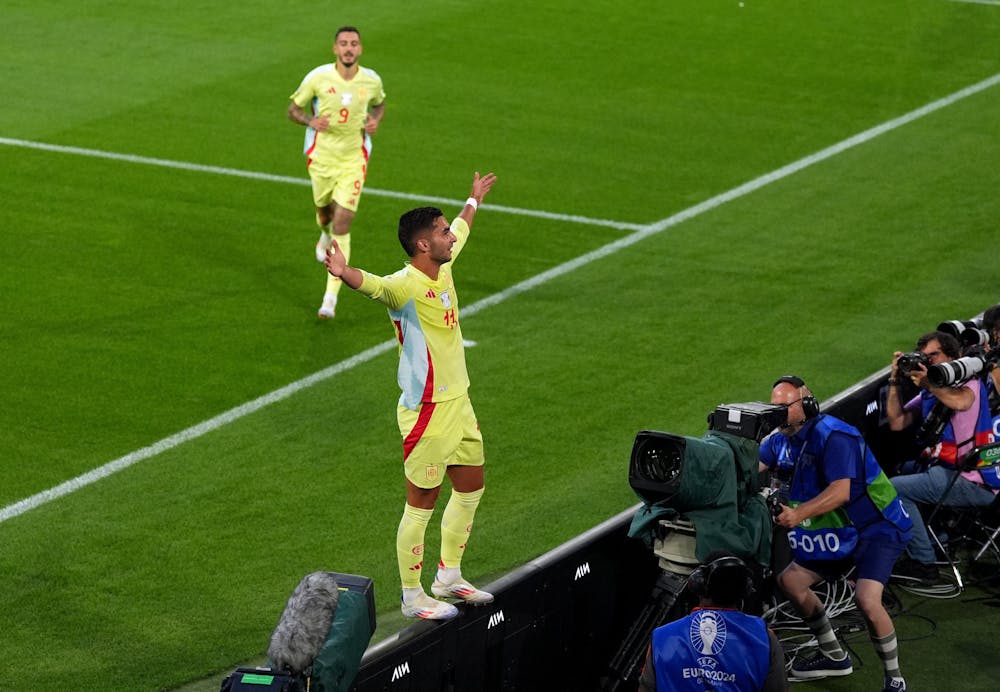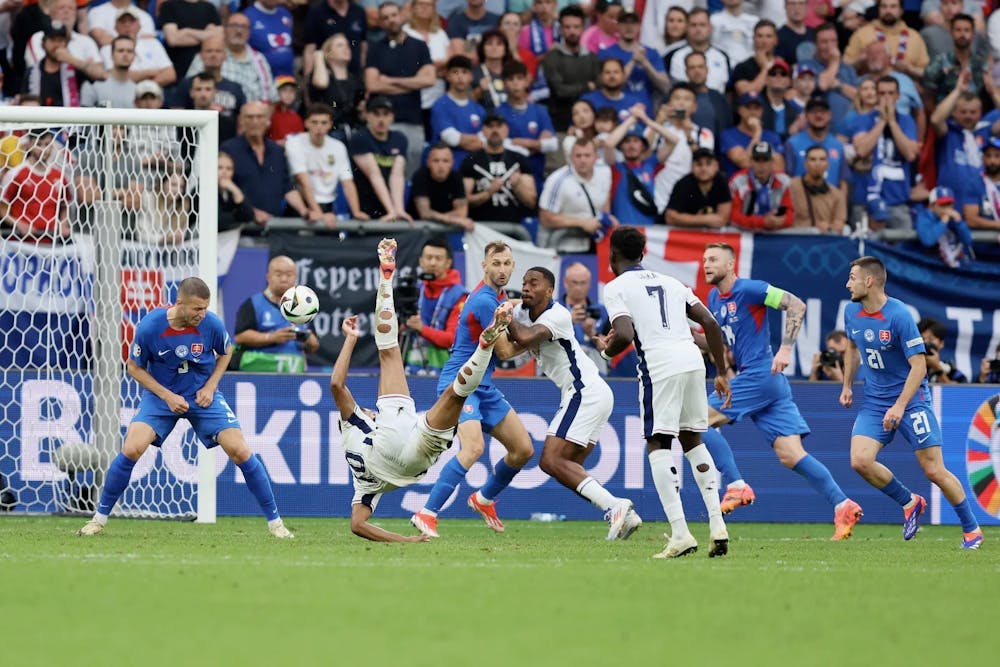Two powerhouses. Two FIFA World Cup winners. Two teams loaded with talent that took very different paths to get to this moment — the final of the 2024 European Championship, set to kick off at 3 p.m. Eastern Standard Time on Sunday.
On one side sits Spain, a team vying for its record-breaking fourth European Championship after dominating every match it has played this tournament. Conversely, England have had a much tougher route, mustering comeback victories against the Netherlands, Switzerland and Slovakia to continue its path to its first Euros victory.
So, how did these two teams get here?
Spain
The Spanish era of 2008 to 2012 may be the greatest achievement in international soccer history. In 2008, Spain conquered Europe with a 2008 Euros victory, then followed up the achievement by winning the 2010 World Cup. The team wasn’t done yet as they became the first team to win the Euros and World Cup back-to-back-to-back with a triumph at the 2012 European Championship.
This team featured legends such as goalkeeper Iker Casillas, defenders Carles Puyol, Gerard Pique and Sergio Ramos, midfielders Xavi, Andres Iniesta, Xabi Alonso and Sergio Busquets, and forwards Fernando Torres and David Villa.
So, yes — Spain was stacked.
But once those legends got old or retired, Spain entered a period of mediocrity. The 2014 World Cup featured a shocking group stage exit, highlighted by a 5-1 demolition suffered at the hands of the Netherlands in a rematch of the 2010 World Cup final. Two years later, Spain was able to make the group stage of the Euros, but its quest for a three-peat quickly ended in a 2-0 round of 16 defeat to Italy.
The 2018 World Cup wasn’t much better. A seemingly cakewalk matchup against Russia in the round of 16 proved to be anything but, and the Russians secured a victory on penalties. Spain finally earned a semi-final appearance in the 2020 Euros, held in 2021 due to the COVID-19 pandemic. But its first semi-final match in nine years ended in heartbreak, with a loss to eventual-champions Italy on penalties.
Most recently, Spain’s quest for a title once again proved futile at the 2022 World Cup. A second-place finish in its group was bad enough, but another defeat on penalties in the knockout stages — the third straight it had suffered — was worse. After the tournament, manager Luis Enrique stepped down, signaling changes were to be made for the next international tournament.
And changes were certainly made. Spain appointed Luis de la Fuente, a youth team coach and former Spanish international, to be its next manager. In his first true test, he guided Spain to a UEFA Nations League victory in 2023, the first for Spain and only the second overall in the tournament’s young history.
With a true international tournament approaching, Spain needed to make changes from its previous debacles. And de la Fuente did just that, swapping his personnel by more than half — 16 players on the 26-man Euro 2024 squad were not on the 2022 World Cup team.
Results improved immediately. Spain breezed through the group stage, securing a dominant 3-0 victory over Croatia and tighter but not close 1-0 wins over Italy and Albania. A guaranteed qualification to the knockout stages meant the Albania match featured all of Spain’s bench in the starting lineup, and the squad did not disappoint, showcasing the depth de la Fuente had on his team.

The round of 16 started off shaky for Spain, with an own goal from defender Robin Le Normand granting Georgia the lead. But La Roja fought back, and goals from Rodri, Fabian Ruiz, Nico Williams and Dani Olmo propelled the Spaniards to the quarter-finals.
Entering the quarter-final match, many pegged the winner between Spain and Germany to be the ultimate victors. And with so much at stake, the match did not disappoint. Spain gained the lead soon after halftime with a calm first-time finish from midfielder Dani Olmo at the top of the box. For the next thirty minutes, it appeared to be smooth sailing for Spain.
That was until de la Fuente decided to switch his tactics, taking off wunderkinds Lamine Yamal and Nico Williams for forward Mikel Oyarzabal and midfielder Mikel Merino. The subs seemed to attempt to fortify Spain’s defense, adding a more defensive forward and a box-to-box midfielder.
The gamble did not prove to be successful. In the 89th minute, German midfielder Florian Wirtz thundered home a volley off the post, forcing the game to extra time.
Chances came for both teams in the added 30 minutes, but only Spain’s Merino was able to finish his off. A wonderful ball serviced by Olmo landed squarely on the head of Merino, who simply had to place his header into the corner for the winning goal in the 119th minute of the match.
Next up for Spain was a semi-final matchup against France, another powerhouse that has made it to three of the past four finals in major international tournaments. The match began at a breakneck pace, with a Fabian header going over the bar and only a few minutes later, French striker Randal Kolo Muani headed home a cross to take the early lead.
Spain were quick to respond, however, in the form of a Yamal wondergoal. Then only four minutes later, Olmo put Spain on top with a thunderous strike that deflected off of French defender Jules Koundé.
The match continued to bring chances for both sides, especially for France in the second half once it needed to really push for an equalizer, but Spain held on to reach its first international tournament final since Euro 2012.
England
The 2020 European Championships was the closest England had gotten to attaining new silverware for the dusty trophy room since its World Cup win in 1966. In that 54-year span, England never reached a semi-final.
Fifty-four years. Zero international tournament finals.
The Euro final ultimately ended that streak, but it did nothing to quell the unpleasant feelings of England supporters. After taking the lead in the second minute, Italy equalized in the second half and went on to win its second European Championship on penalties.
England didn’t have much time to stew over the defeat with another shot at glory just around the corner at the 2022 World Cup. However, that tournament once again ended in defeat as the Three Lions bowed out in the quarter-finals to eventual runners-up France.
Entering the 2024 edition of the Euros, many predicted England to be the eventual champions. Any skeptics usually pointed to its manager Gareth Southgate as the reason behind their ultimate demise.
A former English international and England U21 coach, Southgate was appointed in the fall of 2016, making him one of the longest tenured coaches in international soccer currently. Southgate drew critics from the very beginning with his defensive style of play, often labeled boring and anti-football. However, no one could argue with England’s fourth-place finish at the 2018 World Cup and the finals appearance in 2021.
Even with those achievements, Southgate entered Euro 2024 on the hot seat. By the end of the group stage, the seat was nearly on fire. England looked lackadaisical for much of the group stage, only scoring two goals and generating a total expected goals of 2.09 in the three matches. The squad finished top of its group, but only managed one win and two draws.
With such poor performances in the group stage, Southgate needed a deep run in the knockout matches to have even a chance of keeping his job.
The round of 16 matchup against Slovakia did not begin as England would have hoped. Slovakia took the lead halfway through the first half, and England seemed lifeless in response. Few chances came its way, and when they did, none of the English attackers seemed up for the challenge.
That was until Jude Bellingham, England’s 20-year-old superstar, placed his overhead kick into the bottom corner in the 95th minute of regulation, pushing the game to extra time with England’s first shot on target in the game. Then only less than a minute into the extended period, striker Harry Kane finished off a header at the back post to give England a lead it would not relinquish for the rest of the match.

With such a close result against a seemingly inferior opponent, doubts and questions began to pop up surrounding England. The quarter-final match featured a bout against Switzerland, a team coming off a 2-0 victory against the reigning champs, Italy.
As had been the case for most of the tournament, England began the game slow and with little energy. Switzerland was unable to capitalize immediately, but it finally did so in the 75th minute, when striker Breel Embolo tapped in a cross at the back post.
Conceding such a late goal seemed to signal the end of England’s tournament and likely the end of the Southgate era. That was until Bukayo Saka had anything to say about it. Five minutes after Switzerland’s goal, the 22-year-old cut in off the right flank and curled a shot to the bottom left corner of the net, hitting the post as it went in.
The match continued on into penalties, and the thoughts of the Euro 2020 final lingered in the brains of the English fans. However, England’s five takers — Cole Palmer, Jude Bellingham, Bukayo Saka, Ivan Toney and Trent Alexander-Arnold — all converted their spot kicks while goalkeeper Jordan Pickford was able to save one, securing the victory for the Three Lions and a berth to the semi–final.
As the great Yankees catcher Yogi Berra once said, it was déjà vu all over again. England faced the Netherlands with a trip to the European Championship final on the line, and the Dutch struck first with a wonder goal from 21-year-old Xavi Simons in the seventh minute.
This time, England were able to respond quicker than usual. After a consultation with VAR at the monitor, the Three Lions were awarded a penalty which Harry Kane calmly tucked away only 11 minutes after Simons’ golazo.
Following the early fireworks, the intensity of the match died down. That was until substitute striker Ollie Watkins received a ball on the right side of the box, turned and rifled his shot into the far corner of the goal, beating the Dutch keeper and giving England the advantage in the 90th minute.
As questionable as England’s play had been for most of the knockout stages, it was another comeback victory that had propelled it to only the third international competition final in the nation’s history. No matter the score, no matter the situation, it has become nearly impossible to count the Three Lions out.






